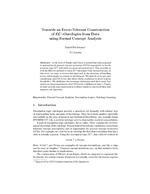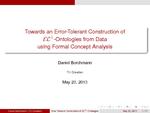Towards an Error-Tolerant Construction of EL^ -Ontologies from Data Using Formal Concept Analysis
From International Center for Computational Logic
Towards an Error-Tolerant Construction of EL^ -Ontologies from Data Using Formal Concept Analysis
Daniel BorchmannDaniel Borchmann
Daniel Borchmann
Towards an Error-Tolerant Construction of EL^ -Ontologies from Data Using Formal Concept Analysis
In Peggy Cellier and Felix Distel and Bernhard Ganter, eds., Formal Concept Analysis, 11th International Conference, ICFCA 2013, Dresden, Germany, May 21-24, 2013. Proceedings, volume 7880 of Lecture Notes in Computer Science, 60-75, 2013. Springer
Towards an Error-Tolerant Construction of EL^ -Ontologies from Data Using Formal Concept Analysis
In Peggy Cellier and Felix Distel and Bernhard Ganter, eds., Formal Concept Analysis, 11th International Conference, ICFCA 2013, Dresden, Germany, May 21-24, 2013. Proceedings, volume 7880 of Lecture Notes in Computer Science, 60-75, 2013. Springer
- KurzfassungAbstract
In the work of Baader and Distel, a method has been proposed to axiomatize all general concept inclusions (GCIs) expressible in the description logic $mathcal{EL}^{bot}$ and valid in a given interpretation $mathcal{I}$. This provides us with an effective method to learn $mathcal{EL}^{bot}-ontologies from interpretations. In this work, we want to extend this approach in the direction of handling errors, which might be present in the data-set. We shall do so by not only considering valid GCIs but also those whose confidence is above a given threshold $c$. We shall give the necessary definitions and show some first results on the axiomatization of all GCIs with confidence at least $c$. Finally, we shall provide some experimental evidence based on real-world data that supports our approach. - Forschungsgruppe:Research Group: AutomatentheorieAutomata Theory
@inproceedings{ Borc-ICFCA13,
author = {Daniel {Borchmann}},
booktitle = {Formal Concept Analysis, 11th International Conference, ICFCA 2013, Dresden, Germany, May 21-24, 2013. Proceedings},
editor = {Peggy {Cellier} and Felix {Distel} and Bernhard {Ganter}},
pages = {60--75},
publisher = {Springer},
series = {Lecture Notes in Computer Science},
title = {Towards an Error-Tolerant Construction of $\mathcal{EL}^{\bot}$ -Ontologies from Data Using Formal Concept Analysis},
volume = {7880},
year = {2013},
}

